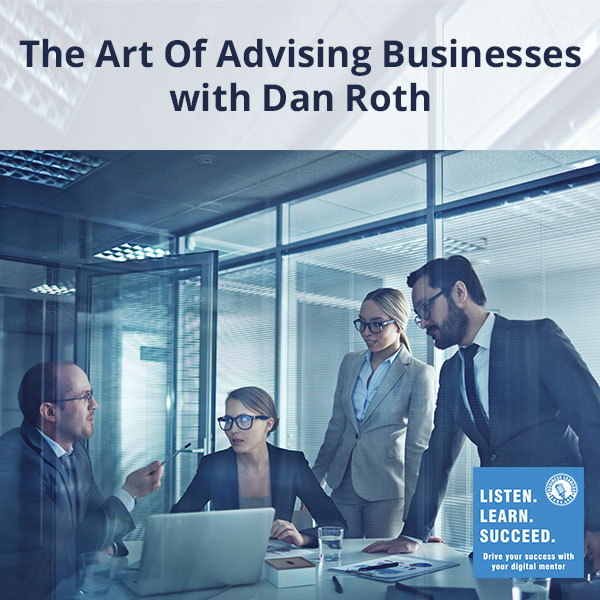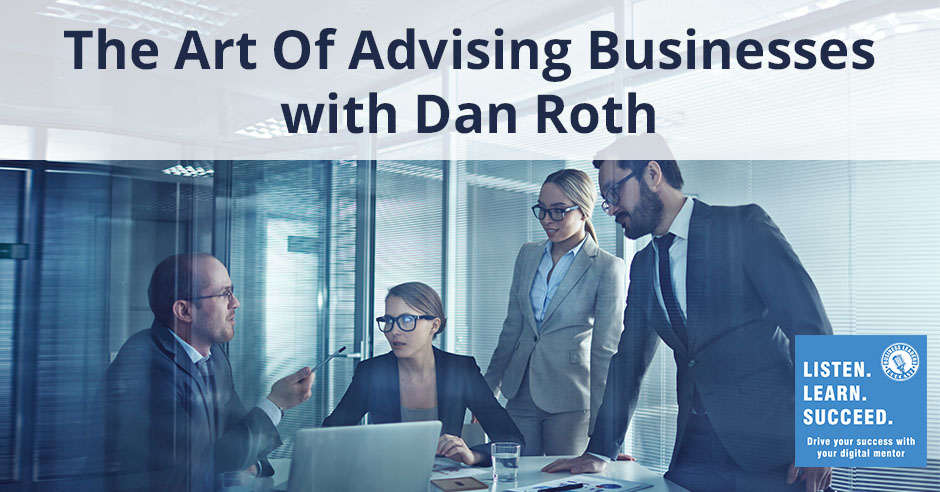The Art Of Advising Businesses with Dan Roth


Managing director of IBG, Dan Roth, went from being a business owner to advising business owners himself. Taking all of those experiences he has gained through the years, he is now one of those rare people who can give you genuine advice about the entire processes and struggles in starting, maintaining, growing and selling a business. He lets us in into some of the methods and approaches he uses in advising business owners while also sharing some pointers on how to deal with buyers and selling. He also discusses topics such as acquisitions and risk management, and shares some personal regrets. And he provides great nuggets of wisdom that’ll help you move your business forward.
—
The Art of Advising Businesses with Dan Roth
Today, we’re incredibly fortunate to visit with Dan Roth. He is a Managing Director at IBG, a merger, acquisition and advisory firm. This is his second appearance on the podcast. We’re honored to have you on the show, Dan.
Thanks for having me again, Bob. I’m looking forward to the time with you.
Dan, tell us a little bit about your business and who you serve. In a thumbnail sketch, what does your business do and what does your ideal client look like?
I work for IBG Business Services, which is based in Denver, Colorado. We’ve been in business since the mid-1980s. We focus on primarily mergers and acquisitions of mid to small-sized companies. Most of the companies we work with are looking to sell either all or part of their companies. Occasionally, we’ll work with companies that are looking to make acquisitions where they have specific types of companies they want to acquire, and we help them manage that process. For the clients that are looking to sell, sometimes they have us work with them right away. When they want to sell the company, we work quickly to get that started. Other times we work with companies that are not ready to sell, but are looking for advice on, “What should I do now to prepare my business for sale in a year or two years or five years?” We do a lot of advising as well to help companies know, “What should I do now so that when I sell my company, I get the most value for it and I find the best buyer.”
What folks may not know is you also started and have run a number of businesses as well.
Earlier in my career, I had the entrepreneurial bug. I started a company when I was in high school in technology and software and was fortunate to hire a number of people and build that up and sell it. A few years later, I started another software company. I was building software for International Banks with a partner in London and we were again fortunate to sell that company to a buyer out of Brussels, Belgium. Working with another partner, we created an investment banking firm in New Port Beach, California. That still runs. I’m not part of it anymore, but the company as I understand is doing well.
From there, I helped start up a company in home healthcare that is now one of the largest private companies in the home healthcare space in the United States. I’ve been involved in a number of early-stage startup companies in technology and healthcare. I love the process. I love to be part of startups. I love building companies. I love to work with business owners, because business owners are a different breed. They are people that take risks, who want to build something themselves and I find a real affinity for working with folks like that.
I think about the experiences that you’ve had in the past. You’re a business owner that’s now coming in to advise business owners. What type of advantage or benefit do you think you bring to that business owner that’s going to be looking for help?
I hope experience. I hope the fact that I have run several companies that were sold or continue to be successful. I have had to make payroll every week, had to manage my profit and loss statement, learn how to figure out how to get new customers, how to deal with unhappy customers, how to hire people, how to let people go, how to grow companies, how to deal with tough times and recessions. I’ve been in their seat where you’re running the company and everybody is looking to you to figure it out. I hope that gives me some ability to relate to other business owners that are going through the same thing and may want to be across the table from somebody that’s been there and done that.
People like free advice.
That would make you somewhat unusual. I don’t think there are a lot of guys that have run businesses successfully. For the guy that’s listening, he goes, “Am I the ideal type of client? What makes me ideal for you?” What’s your prototypical client look like?
I have different types of clients. The most obvious are companies that are ready to sell and would like to get a transaction done in the next year. I come in and help them get that done. Many companies that I work with aren’t clients yet. These are owners that I have met because they have been referred to me and who are looking for some advice, some counsel and some coaching on, “How do I position my company so it’s more valuable down the road?” I have all different kinds of businesses that I’m talking to on a monthly basis or a quarterly basis. Some are in the process of selling, some are clients where we’re looking to buy companies, but others we are simply talking periodically regarding goals and progress towards their objectives. I often focus on figuring out what are the next steps to get that company positioned for sale so the owner can maximize the potential down the road. These clients are from all different types of companies, ranging from manufacturing to distribution, from business services to consulting and staffing, from government services to engineering. Also, quite a bit of software and healthcare because that’s a pretty good part of my background, but also education and pretty much the gamut of different kinds of companies that I find that I end up helping in one way or another.
For some of the business owners out there, they’re going like, “If I talked to Dan, what type of information should I have at hand to have a meaningful conversation?”
Most of the initial conversations that I have, we don’t share a lot of confidential information. I’m happy to provide a confidentiality agreement if we’re going to have those levels of discussions, but typically the initial conversations are pretty high level where we decide whether they want to ask for my help and whether I can be helpful to them. Those typically focus on, when would you like to be selling, what does your business do, how did you start your company, and what are the challenges that you face. The basic questions I used to ask when I was a consultant on Arthur Andersen. They don’t change, it’s not complicated and typically that first discussion is do we even have a rapport or reason to keep talking to help each other out, and then we go from there. If that’s the case, then we might share some more specific information, but that’s well down the road typically.
 Advising Businesses: The first discussion is finding out if you have the rapport or reason to keep talking to help each other out.
Advising Businesses: The first discussion is finding out if you have the rapport or reason to keep talking to help each other out.
You had the business owner and they go, “There’s value that you can bring to the table. I’m interested in talking further with you. I’m assuming there’s a fairly typical series of questions you might ask that business owner. What are the top two to four questions you typically try to ask business owner getting ready to go down this road?
They’re pretty much always the same. The first one is generally, “How did you get into the business? What made you start it? Did you inherit the business from your dad or your mom? Did you take over the company from a former boss? How did you get into it? Why did you get into it? What made you want to be a business owner in the first place?” The second question is usually something like, “What do you do? What does your company do? How do you make money? Why do customers buy from you? What gives you an advantage over your competition, and what are the things that concern you about your business?” The third general question is, “Where do you want to go with it? Are you loving it? Do you want to keep running it for the next ten or twenty years? Do you envision selling it at some point?” Sometimes I talk to business owners and at the end of the conversation we go, “We shouldn’t be selling this business, we should be buying other companies. Let’s put a strategy together to go do that and I’ll help you figure out who to buy, how to buy them and how to buy them right.” The fourth question is simple, which is, “Can I help you? Is this going to be worth your time?”
Who are business owners you do not want to work with?
If I get a call from a business owner and they say, “I would like some advice, but I don’t want to have somebody like you represent me.” I get a lot of those calls because they don’t want to pay the fees that are charged. My typical response is, “Why are you calling me?” People like free advice and that’s fine and I’m happy to give my share. Then they’ll say, “I can find my own buyer. I already have buyers calling me.” I just say, “Good luck.” We use a line in our business, I didn’t come up with it, “Don’t do your own brain surgery.” I, for the life of me, do not understand why business owners build something for years and years. It’s the most valuable thing they own. It’s going to be the most valuable business or thing or entity that they ever sell in their entire lives. Even though they never sold a business before, they think they could do it themselves. I just say, “Good luck,” because you’re going to leave so much money on the table if you even get a deal done and you’re not going to understand how to get a deal done right. The buyer is going to take advantage of the fact that you don’t know what you’re doing.
You have to be realistic about what’s really going on because too often, people are not.
There’s a statistic that I’m aware of about three-fourth of the businesses that come to market don’t sell. You and I think about that business owner who says, “I don’t know that the fee is going to be worthwhile.” I don’t think from my experience that business owners have an understanding the full range of exit options that they have, whether it’s a strategic sale or it’s a competitor that they sell to or carve out or any of the other things that go on. For you, in the business, you have an understanding where their revenues are and earnings and all the nuts and bolts, what do you do to start trying to collect potential buyers to take a look at the company?
There are two scenarios there. One is if I or our firm have been retained by the business so we have an agreement to market them. Then we’ll do a lot of research using databases that we have on who are the buyers that are out in the marketplace, who are interested in their kind of company. We invest quite a bit in those types of databases, whether it’s strategic buyers or private equity firms or family offices. We’ll use databases typically to do that as well as our own knowledge of the marketplace. The second scenario is if I’m mentoring a company that I may not be selling for two, three, four or five years. Because I have a dialogue going with that business owner, as I see potential buyers come across my desk in one shape or another, I will keep track of that.
As an example, I’m about to market a company that I started talking to in 2014. At that time, the company wasn’t ready to sell, but the husband and wife knew they would sell in the near future. I’ve been talking to them about what to do and how to get the business where we can sell it. They’ve gone from about $16 million in revenue to well-over $40 million in revenue, an extremely profitable company. Along the way, as I’ve had the dialogue with this family, I’ve been keeping a list of the buyers that are buying companies like theirs. When we go to market in the next couple of months, I’ve already got a preset list of about 30 to 40 buyers that I know who are going to take a look at that deal.
When you look at that revenue change over that period of time that had been advising the company, do you find that unusual?
Yes, I know every company thinks that they are going to go from $16 million to $40 million in five years, but rarely do I see that.
For these folks, without disclosing who they are, what they do, what do you think were the top one or two things that you helped them with that changed their value metric?
The number one piece of advice that I gave them several years ago that they stuck to was focus on profit. At that time, they were more focused on generating revenue. I told them when we get to the time when we’re going to sell this company, the most important factor is going to be how profitable you are. Start now with cost reduction programs to generate a higher profit, start going after higher profit contracts, shed lower profit contracts, so that when we go to market to sell your business, we’re showing the highest profit margin that we possibly can. The second thing that they did, which worked well and they were fortunate, is they focused on getting long-term contracts, two to four-year contracts that have helped their company and allowed them to do exceptionally well in a competitive environment.
You have this company out here, they’ve moved their revenue numbers and they started establishing longer-term contracts. From the perspective buyer first thoughts, when they come talk to you, how big a difference is a longer-term contract versus a short-term contract in their eyes?
If you’re in a business where contracts are important, the length of the contracts and how solid those contracts are is extremely important to the buyer because that’s almost like guaranteed revenue. When I’m selling companies that are oriented around contracts, government contracts, large company contracts, the more solid those are, the longer those are, the larger amount those are, the stronger the buyer views that business because it’s much lower risk. Lower risk almost always translates into higher value.
Don’t do your own brain surgery.
Within that process, when you look at some of these companies that are coming to market, when you look at the structure of the company between customer concentration risk and whether the owner of the company is the main salesman, do you have much input with those folks when you have those circumstances occur?
If I’m helping them years ahead of the sale, yes. If I’m helping them and we’re selling the company in the next twelve months, no. It depends on how early I get involved to help that business owner with essentially coaching to an exit value, but those are the types of things that we would focus on ahead of time. Customer concentration, do you have a management team, long-term contracts, recurring revenue? These are basic fundamental aspects of a valuable company.
I’m thinking you’ve got the one company you’ve worked with for a very long time and then I’m assuming periodically you get a call and says, “I need to sell my business in the next six to nine months, I’ve had an event.” What’s your typical thoughts and dialogue with that business owner that maybe had a health event or distress with a partner or something like that?
Those are harder. You never want to be in a position where you sell a business because you have to. Unfortunately, that does happen, whether it’s a health event or a divorce or a partnership issue. Too often I see that situation. It’s a case-by-case deal but generally my approach is to sit down with the owner if they trust me. If we have a relationship going, do a very quick candid assessment of the situation and then hopefully bring my experience to how do we position this company to buyers in a way where we don’t take too big of a hit because we’re selling it under a duress situation. It takes some planning but you’ve got to move quickly. Probably the number one thing in those situations is you have to be realistic about what’s going on and too often people are not. They still aren’t real about what’s happening when they have to sell. The more time that you waste, the worse it gets typically.
 Advising Businesses: You never want to be in a position where you sell a business because you have to.
Advising Businesses: You never want to be in a position where you sell a business because you have to.
“The guy down the street, he sold his business for this, so I should be able to sell my business for that, too.” I’m sure you’ve heard that all the time.
Every business owner I talk to has heard about some other deal that somebody sold for some amazing valuation and therefore that’s their value. That’s simply not how it works. Unless you’re a company that Google’s going to buy because Google has crazy money and you’re in the software industry with hockey stick projections and social media tech company or whatever, right now that’s super-hot. There are very few companies that get those types of valuations. Unfortunately, too many owners delude themselves into thinking, “Since that guy got it or that woman got it, therefore I’m going to get that value and that’s what I deserve.” It’s simply not the case, the market doesn’t work that way.
Putting my head on backwards, you have the guy that comes in or the lady that comes in with their company and they fall in love with their company again and they go, “I don’t think I want to sell my company.” You look at them and say, “Maybe you should be acquiring.” How does that discussion go?
Typically, the acquisition discussion takes place when I’m working with a business owner that has big plans, that has capital available, that wants to grow fast. That has quite an engine behind their company. They’re not looking to exit, they’re looking to build, and they love the process of owning and building. The acquisition side of the discussion is generally more oriented towards somebody who wants to grow and grow faster and is willing to take the risk of buying companies and has access to the capital to get deals done. That’s probably less than 10% of the business owners that I talk to.
In looking at all the tombstones, how many businesses do you think IBG has represented in the sale over the past number of years?
I’m not the owner of this company. I just work here. Our marketing literature says somewhere between 1,100 and 1,200 companies. It’s quite a few.
The reason I bring that up, you’ve got that business owner that wants to talk and it’s like, “I want to sell my own company.” Maybe the first time they’ve ever sold a company, typically 80% plus of their net worth is tied up in their company. What’s the dialogue with that guy who wants to sell his company without your help?
The biggest risk of doing a deal yourself is not accessing the right buyers for your company and selling to a single buyer.
I don’t approach it that way, because I don’t want to sell a business owner on using my services. If I have to sell you on using me, I’m probably not the right fit. What I tell people who want to do it on their own, as I pointed out, “Here are the risks that you’re taking and here’s where you could get yourself in trouble.” I’ll answer it that way by saying that, “Probably the biggest risk of doing a deal yourself is not accessing the right buyers for your company and selling to a single buyer.” Often the way this happens is a business owner knows of somebody that’s been calling them that wants to buy their company. It’s probably a competitor or somebody that knows about the business and they tell me, “Anytime I want, I can do a deal with X Company.” That’s great, you’re just not going to get top value for your business. You may sell it, but you have almost no chance of getting the highest value or the best terms for your company.
The second biggest issue is you don’t know how to negotiate the sale of a company. It’s not like selling a house. Selling a house is pretty easy. You come up with a price, the buyer goes and gets a mortgage. You close on a certain day. Everybody signs the papers and you’re done. Selling a business, I don’t care if its $2 million in sales or $300 million in sales, it is very complicated. A typical purchase contract that I deal with on a business sale is anywhere from 60 to 200 pages of legal contractual language, much of which I don’t even understand. That’s why every deal that I work on, I always make sure we have a topnotch merger and acquisition attorney as part of the process.
In thinking about a couple of things of all the customers that you’ve worked with over time, can you characterize how many of them get an all-cash offer versus not an all-cash offer?
Maybe this means I’m not very good at what I do, but very rarely do I sell companies for all cash.
No, that’s reality.
Probably in the last ten years, I might have sold two or three for all cash. The rest of them were a cash plus an earn out or cash plus different structures. A part of that is that’s how we get to a higher value because different components to the structure get us to a higher value, but that means you’re shifting some risk back and forth between the buyer and seller.
The risk management deal from the seller.
It’s all about risk management.
When you deal with the business, what type of team do you think is appropriate for that business owner to have onboard?
 Advising Businesses: An advisor who does not operate with candor is not a good advisor.
Advising Businesses: An advisor who does not operate with candor is not a good advisor.
Whether I start working with a client and we’re selling in the next year, or even when I am talking to a business owner who’s not even a client yet but I’m coaching them, perhaps for two or three or four or five years before we do anything, I always tell them to assemble a team around them of independent advisors. Independent is very important. Most business owners have advisors that are their friends and friends generally don’t tell you what you need to hear. Candor is not part of how they operate. That’s not a good advisor. As far as the advisors that you’re going to need when you sell your company, you’re absolutely going to need a good merger and acquisition attorney and there are not a lot of good ones around. You’re going to need some good accounting help. All businesses have some in-house accounting, but probably you’re going to want to have some outside accounting help.
You should have a wealth advisor. Somebody who can look at your asset base, who can look at your company, who can look at your lifestyle, who can coach you on regarding, “Here’s what you need to get to so that when you sell your company, you can maintain your lifestyle or increase your lifestyle.” Most business owners that sell unfortunately take a diminishment in their lifestyle over time because they didn’t plan properly. The last person that can be important is an insurance person who’s skilled in the areas of how to set up different types of insurance, pre and post-sale to protect your assets, and manage your potential liabilities. If you want to, some of my clients are fortunate enough to do so well on their sale that they want to do some charitable work, charitable remainder trusts or whatever vehicles you want to use. In that case, the wealth management person and the insurance person can work together to set up those vehicles. That’s the core team that you need.
Do you find often that when you talk to the business owner and the sale is about to occur, that they’ve thought about the Monday after the sale?
Some business owners have been planning for it for a long time. Others, no. Others will tell me, “I know I need to sell my company, I’m at an age where I need to sell but quite honestly, I’m not sure what I’m going to do with myself.” Those are some interesting conversations that we have. If I know them well enough and we have a good enough relationship, I’ll give them some suggestions. Some take them, some don’t.
The more time that you waste, the worse it gets.
The statistics are pretty high on the folks that sell their business, twelve months after the sale many of them go through and go, “I would have either done that differently or I wouldn’t have done it at all,” because they’re at a loss of what to do because you only hunt, fish or golf so much.
Every business owner who sells a company they’ve built for years and years had some regret after the deal is done. It could be, “Now what do I do because my whole life was defined by my business?” The regret is often, “I didn’t get what I should have for my company because I didn’t sell it to the right buyer.” That’s probably the number one regret that I hear. You have to have a plan for, “What am I going to throw myself into?” Entrepreneurs generally are people who have type A personalities. They’re driven, they’re busy, they do things all the time. When all of a sudden you don’t have this company to run anymore, you need something to fill that void or multiple things to fill that void, for sure.
There’s a whole industry that serves that side of the house. That’s a bit of a recent revelation for me where they’ll go through and they deal with the family members or they deal with the psychology of the transition. We’re going to shift gears here a little bit in talking a little bit about some of the things that I’ve been influential for you. Reading material, what book has influenced you recently that you’re working though?
I love the book by Adam Grant, Give and Take. It’s a very interesting book by a Wharton professor who profiles three different types of people. There’s a giver who’s more of a selfless type of a person. There’s a matcher who’s essentially like, “I’ll do something for you if you do something for me.” Then there’s what he calls the takers, which some people would define as the selfish type of a person. He studies people within a corporate environment and how that operate in business and how you often have takers who are louder and pushier and tend to get a lot of attention.
His research suggests that givers, who are quieter, more selfless, not boastful and work to make help others, at the end of the day, are far more successful and produce far greater results. Those are certainly the types of people that I admire, people that are very quiet and get the job done. I’m not a big fan of people that do a lot of boasting and talk about how great they are and are always trying to embellish themselves. It’s not a characteristic that I admire.
Probably your attraction to the business owners because most of the business owners that I know, they work hard.
I admire that.
They have courage, no doubt.
If I run into a business owner that’s boastful and wants to tell me how great he or she is, we don’t click. Those aren’t the clients that I end up working with. They don’t like me and I don’t like them. We don’t fit.
Looking back over your career, we get bumps in the roads or what we would characterize as failures. Is there a failure or a bump in the road that you look back on that has set you up for your current success?
I’ve had many failures over my career. I’m one who believes if you’re not having failures, you’re not trying. One that comes to mind, the one that I beat myself up about most often, my biggest failure, I had acquired some companies quite a few years ago for my own account and one of the most successful companies that I owned burned down in a fire, completely destroyed. I ended up in years of legal battles with more lawyers than I care to count. It took a huge toll on my life. For that four or five-year period when that was going on at, that’s definitely the worst four or five years of my life. My failure there was that I didn’t properly anticipate a disaster. What I did is I failed to handle it as well as I should have, which impacted the people around me in a bad way and I regret that immensely.
 Advising Businesses: If you’re not having failures, you’re not trying.
Advising Businesses: If you’re not having failures, you’re not trying.
For you, when you talk about risk and insurance previously, I’m assuming risk and insurance would have been helpful in that situation.
Without getting into all the details, I did have insurance. Unfortunately, the agent that I used unbeknownst to me did not set me up with the insurance that I needed in the case of this particular fire. At the end of the day, it was my responsibility to know, but I didn’t. You talk about a failure and a regret, that’s it.
Tuition is expensive.
That’s my most expensive lesson for sure.
If you can put an ad on page one of the local business paper sharing your message, what would it say and why? The readers are business owners, what advice on page one would you offer?
The advice that I would offer that I seem to be offering more as I get older is to make a difference. I’m trying to make a difference and do better by the people around me, and my clients and people that I know. We live in this very toxic world. Business owners simply because of their makeup, are in a unique position to make a difference beyond profit and loss statements. That’s the thing that’s important to me right now is in my little world, how can I make a difference and in your world as a business owner, how can you make a difference beyond your business?
The thing that gets lost sometimes in the middle of this was the business owner. The business owner also employs a lot of people with families. They’re responsible for lots of mouths to feed at night. You think if the business owner does well, by and large, the employees and their families do well.
I can tell you I’m selling a company right now, a 64-year-old owner. He’s run his company for 43 years and we talk all the time. It’s going to sell probably in the next two to three months. He talks to me almost every time we chat about how he has 46 or 47 different people that work for him. The biggest responsibility that he feels is to make sure they have paychecks every week to take care of their families. That is the single most important thing to that business owner. I admire him so much because that’s his core belief. He knows those 46 or 47 people are what allowed him to be a successful business owner and to own a business that we’re going to be able to sell for quite a good value in the next couple of months.
For you, looking back at the allocation of either your time or initiative, what’s helped you the most recently and why?
From a personal perspective, what helps me is exercise. I try to exercise a fair bit, as I got older it’s more and more important. I exercise in the mornings. I notice when I exercise in the morning, I am more productive all day and the days that I don’t exercise, I’m less productive. I would say number one for me is without a doubt exercise, but second is time away from work. I’m a big believer that I work hard, but I don’t work on weekends and I don’t work at night, at least very rarely. I work hard during the day and I manage my schedule, I manage my clients, I manage what I’m doing so that my work day ends. I believe those two things allow me to be even more productive when I’m working. In my own personal life, I’m much happier because I’m not defining my life by work.
Simply because of the makeup of business owners, they are in a unique position to make a difference beyond just profit and loss.
What’s your most unusual habit or what others might consider out of the ordinary that has helped you the most?
What people would say is unusual about me is that I don’t chase clients. Most people think in this business when you have somebody that’s interested in working with you, you call them, you email them, you pester them, and you constantly badger them to make sure that they hire you at some point. I don’t do that at all because I believe business owners are grownups so they can make their own decisions. If they want to work with me, they’ll decide to do so. If they have questions for me, they’ll reach out to me. I don’t believe in pestering people as a general rule. I don’t want to be pestered, so why would I pester somebody else? I’m pretty busy so it seems to work for me, but that style goes against the grain of what most people do, which is this constant pestering and badgering of people, which I find uncomfortable.
I don’t like it myself. I wouldn’t offer it to somebody else.
I don’t know if that’s an unusual habit, but I know people think I’m weird because I go about it that way. They question me all the time. People think I’m weird for a lot of reasons.
With all the business owners and CEOs that you’ve worked with through the years, what advice would you offer to a new CEO that’s assuming that role for the first time?
If you’re a CEO and you’re taking over a company that’s up and running, I did this one back in my career years ago, I became the president of a company that was about a thousand employees and I was brought in by the owner because the company was struggling. I sought advice from a number of people before I started on what to do and this is the advice that I got, which I used and which worked well for me. The first thing was that I spent the first 30 days just listening to people. I didn’t come in with my agenda. I didn’t come in and act like I was some big fancy CEO or president here to take over the company. I went out and I listened to everybody that I could meet in the company. I spent time with people individually or in groups and I listened a lot. I came back and I said, “Here’s what I heard and here’s what we should do about it.” I asked for their buy in.
One thing is don’t come in day one with a plan. Take some time to get the people that work with you and for you to get involved in what you’re trying to do. The second is that I would form some advisors around you who are separate from the company and I’ve used them as a sounding board. One of the most effective things private companies should do and don’t do is have an outside board of directors. It’s free or low-cost advice. You should absolutely have that when you’re taking over a company. The third thing is that I would set yourself a 100-day plan and I would tell the people in your company, “Here are the five things that we are going to accomplish in the first 100 days.” I would make sure you accomplish those five things because if you don’t, you have no credibility
Looking back over the past few years, what would, or should you have said no to?
I should have said no to buying the company that burned down. I should have said no to several clients that I’ve tried to help that I have not been able to help because they don’t listen and they’re stubborn. They have not had the results that I hoped for them. I don’t do well with business owners who think like that. I should have said no to those types of clients. These are smaller things, but I should say no to certain projects that I’ve gotten involved in that were not a good use of my time.
For the folks reading and said, “I need to talk to Dan. I’ve got some questions.” How do they find you on social media?
I’m on LinkedIn. IBG Business is the company that I work for. They can call me. My business line is (303) 785-0531. They can email me at DRoth@IBGBusiness.com. I’m always happy to talk to folks that are business owners. One thing that I haven’t made clear is a lot of the coaching that I do and helping the business owners, I don’t charge people for that. I view that as a long-term investment in helping you sell your company someday down the road. Don’t feel like if you reach out to me, I’m going to try to stick for some large bill or some big consulting fee. It’s not what I do.
I often say this, the biggest mistake that the audience can make is not calling. If they have a question, call.
 Advising Businesses: The biggest mistake that the listener can make is not calling.
Advising Businesses: The biggest mistake that the listener can make is not calling.
The best part about what I do is I work with business owners every day and they’re a unique club of people. The membership is very hard to get into. I’ve been so privileged throughout my life to either be a business owner or work with business owners all the time. I couldn’t be more pleased that that’s what I get to do.
I get to do it in the podcast, to talk to business owners all the time.
You meet some amazing people.
It’s an awesome bit of tutoring as well. Was there a quote or what quote influences you or use regularly?
I can’t recite the whole quote, but it’s on my LinkedIn page because I think of it so much. It’s The Man in the Arena quote, which is essentially my definition of an entrepreneur. It was President Theodore Roosevelt who came up with the quote and essentially it says, “Don’t take shots at people unless you’re willing to try it yourself first and get in the arena and fight the fight.” Those are the kinds of people that are business owners and people who aren’t business owners can’t relate and they’ll never understand it. There’s a big difference between somebody who provides a job and somebody who wants a job.
The Man in the Arena is a fabulous quote that hits home with that. I was originally exposed to it by a woman who has two of the most watched TED talks ever, Brené Brown. She’s fabulous. She talks about The Man in the Arena. That’s why I looked it up. Her whole area of expertise is on the idea of being vulnerable, which is an interesting concept for business owners. The more vulnerable you are, the better off you’re going to be. It’s hard to take that step.
That’s almost like the antithesis to, “I know everything. I’m in-charge,” military style.
I’m pretty sure in my younger days I didn’t have any vulnerability and I didn’t have any humility, but I’m getting it. The more that I can share that with others, I hope the more successful I will be and hopefully, they will be.
If I was to poll the business owners that you represented that have sold their business and said, “What is the thing that Dan is best at?” What do you think they would say?
I hope they say more than one thing, but the word that I hear most often from people in that regard is the word candor. Most of my clients would say, “One of the best qualities about Dan is that he always speaks with candor. He doesn’t tell me what I want to hear, he tells me what I need to hear.” That’s pretty much what people would say about me. I don’t know any other way, but there are so many people in this world and in the business that I’m in that make stuff up and say things that have no basis in truth. I shake my head and go, “I’m amazed that works,” but the amount of dishonesty that goes on is staggering to me. It’s a sad thing that being straight with people, seems to be unusual these days.
I can’t tell you how much I appreciate you taking time out of your day to visit with us on the podcast. I would tell the owners, “If you’re not talking to this guy and you’ve got it in mind, you should reach out to him and say hello.”
That’s awfully nice, Bob. Thanks for inviting me and I enjoyed spending time with you again.
Thank you.
Links Mentioned:
- Dan Roth
- Give and Take
- Dan Roth on LinkedIn
- IBG Business
- DRoth@IBGBusiness.com
- Brené Brown
- https://IBGBusiness.com/
About Dan Roth

I help business owners position their business for sale, complete strategic acquisitions and raise capital. I teach courses about how to build business value, strategic planning and the importance of culture. I like working with technology and healthcare startups. I still write code occasionally (C++, JavaScript, etc.). It has been my good fortune to work with and lead some amazing people. That is what I enjoy the most…I love working with talented people who are not afraid to ask why, challenge status quo and constantly look for better solutions. That’s a blast.
Love the show? Subscribe, rate, review, and share!
Join the Business Leaders Podcast Community today:
- businessleaderspodcast.com
- Business Leaders Facebook
- Business Leaders Twitter
- Business Leader LinkedIn
- Business Leaders YouTube
The post The Art Of Advising Businesses with Dan Roth appeared first on My podcast website.